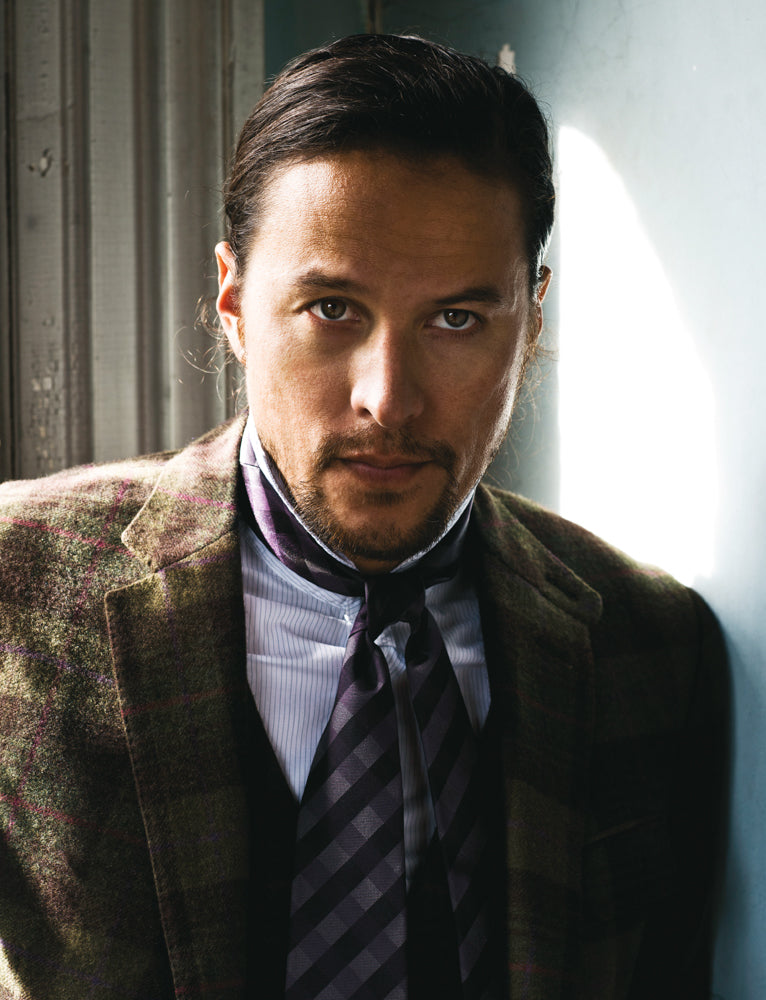
Fukunaga On Fire
FUKUNAGA ON FIRE


Cary Fukunaga can’t sit still long. We’re supposed to meet up at his favorite restaurant, a country-in-the-city artisanal joint near his home in the West Village. It’s the kind of place that specifies its squid’s home state (Rhode Island) and serves a $25 duck breast cooked with “smoked hen-of-the-woods mushrooms” and “preserved lemon gremolata.” He’s already here having another meeting when I arrive, with a line producer from his latest film, Beasts of No Nation, about child soldiers in West Africa. He says he needs to stop by where it’s being edited, also only a couple of blocks away.
He’s on his feet, and, once he’s dispensed a few dude handclasps with the marble countertop staff — he’s clearly here all the time — we’re out the door, walking quickly. Watching him do this makes me think of something the producer of his first feature, Sin Nombre, about Latin American migrants and their perilous journey north on freight trains, once told the LA Times about him: while filming, “I never saw Cary once sitting in a chair behind a monitor.” When the cameraman had to get in the river, “Cary got in the river. When someone had to be on top of the train in the rain, Cary was on top of the train, in the rain.”
Fukunaga’s wearing a hoodie over a green T-shirt featuring a map of Ghana, a production souvenir from Beasts. His hair has reverted to a Jake Gyllen-haal–style sensitive-jock topknot, not those Snoop Dogg braids he had at the Emmy Awards. But thanks to his win that night — for directing the entire first season of HBO’s swampy and satanic (and not entirely sensical) True Detective — not to mention his could-be-in-front-of-the-camera looks (and the related fact that he dated Michelle Williams), the thirty-seven-year-old has become one of the most recognizable young directors in Hollywood. And he’s well on his way toward being in the position of not only having what seems like an endless number of sometimes-peculiar ideas for films (a musical based on the myth of Pyramus and Thisbe), but the cross-genre track record (in 2011, he did a reboot of Jane Eyre) and career charisma (Sin Nombre won the directing award at Sundance in 2009) to be able to actually get them made.


“I think our society is headed more toward chaos than structure. Even though there’s less killing going on, there’s more instability.”
And he’s impatient to keep moving. Most directors would not consider True Detective a sell-out project, but he’s not returning to it next season, and seems glad to be done with it (though he’ll continue as an executive producer). Not unlike Rust and Marty, he didn’t always see eye to eye with its writer, novelist and first-time showrunner Nic Pizzolatto. They both wanted to be in charge, and a note of slightly condescending exasperation creeps into Fukunaga’s voice when he mentions him.
No wonder someone started a fetishistic (if slightly mocking) Tumblr called HasCaryWonYet, “A blog dedicated to the future Academy Award winner Cary Joji Fukunaga.” (It’s a great resource if you’re interested in watching his haircuts evolve, too.) Or that, post-Emmys, TheCut.com, swooning, declared him their “fake celebrity boyfriend” with “cheekbones razor sharp enough for us to want him to father our children.”
Unlike a lot of Hollywood hotshots, Fukunaga comes off as less a cosseted celluloid careerist than a guy who treats his work, and his life, like an intellectual adventure sport. He was born in Oakland, California, the son of a Swedish dental hygienist and a Japanese father. His mother remarried a Chicano fireman; his father, a woman from Argentina. He moved around growing up, from the suburbs to the country to the barrio (“Crips and Bloods, people getting shot”), and once described his family as a “conglomeration of individual, sort of displaced people.” After his pretty, polished assistant offers to get us coffee when we arrive at the pristinely refurbished old industrial building where he’s renting an editing studio, he says that “I think it probably wasn’t until even Jane Eyre that I started to realize that all these films that I’ve written so far or worked on are essentially about orphans. I am not an orphan, but maybe I’m some other version of that somewhere inside my head, and that’s the reason why I gravitate to those stories.”
He’s an athlete, only having quit his promising snowboarding career after realizing he didn’t want to end up a chair-lift operator, and was seriously into capoeira for fifteen years until his body started “hitting a plateau” and he began worrying about his joints. These days he bowhunts (he has a tattoo of crossed arrows between two of his fingers, which he says is unrelated). While in England, directing Jane Eyre, he learned how to ride horses, his new obsession. “When I feel like I have a knack for something, I want to get really good at it. And I felt very natural on horses. It definitely linked to the adrenaline of snowboarding and the competitive side of myself”. Plus, he enjoys “the complications that come with another brain being attached to what you’re doing.” And, with some embarrassment, he admits he’s lately gotten into polo.


“I needed to figure out what kind of sport I was going to play when I’m in my sixties, and I think I’ve found it in polo. But it is bloody expensive.” He fingerprint-unlocks his iPhone 6 and shows me photos of him riding his ponies, Pampo (his favorite) and Panda, which he keeps at a farm upstate. “There’s different kinds of polo,” he assures me, sounding a bit defensive. “You could spend three hundred thousand dollars a year on a polo team” and play in the Hamptons, but “my kind of polo is on a farm in Argentina, or in Africa, or upstate New York and just pickup polo matches. Like pickup basketball. Let’s play a good, friendly, competitive game. It’s not about wearing white pants and women on the sidelines with gin and tonics stomping my divots. It’s really about, I want to have some good horses and score some goals. That’s it.” Think of it as bro-lo.
I tell him it still sounds expensive, and so it’s a good thing he’s slated to direct a planned two-part screen version of Stephen King’s killer-clown page-turner It (even though he was too scared to watch horror films growing up). That, and his executive-producer credit for future seasons of True Detective, ought to keep him in polo ponies for a while. He laughs. “I will say that when a check comes to the table these days, people aren’t rushing to pay for it if I’m sitting there.”
But he’s hardly rich, he says. “A movie like this,” referring to Beasts, “you don’t make any money on it. You’re losing money on it over the course of the year, because what you make on it is less than what you spent.” And so, “You have to balance those projects,” he says. “It’s a matter of survival. Anyone just making art films, either they’re incredibly dedicated to their art or there’s some background of wealth that allows them to do that. I grew up not poor enough, but not wealthy enough to want to live a more comfortable life.”
But before he gets to It, he’s going to start work on a script based on the book The Black Count, about the biracial French Revolutionary general Alexandre Dumas (whose son of the same name wrote The Three Musketeers). It fulfills another fanciful idea he’s had for a while: “This is the movie I could potentially direct from horseback.”


“The amount of former combatants I met who had killed or eaten people and were living completely normal lives was astounding.”
Beasts of No Nation is based on the 2005 novel by Uzodinma Iweala about child soldiers in West Africa, the beautiful, bedeviled region now best known for being ground zero for Ebola. They filmed there for five months earlier this year, stopping in July, shortly before it became a hot zone for the epidemic. Fukunaga not only wrote the script and directed it, but, because he couldn’t sit still, acted as his own cinematographer. “I think for me it was helpful just because I move fast,” he says. “There’s nothing worse than when you’re really tired trying to explain everything.”
He’d spent some time in Sierra Leone before, researching a script, in the mid-aughts (a friend in the Peace Corps, knowing his interest in the region, gave him Iweala’s book). But filming an actual movie there — it stars Idris Elba, among others — was something else. “It was the most difficult place I’ve ever made a film, and in the most moronic and unexpected ways, to the point that to be surprised every day about the stuff that was happening wasn’t surprising. At some point you’d think I would stop being surprised by, like... are you serious? That’s what the issue is today?” he says. “The drivers realized that they could renegotiate their contract every day and try to ask for more money. We’d fight, and we’d fight, and we’d fight, and eventually, we’d reason with them, but we lost hours every day just doing that.”
With the curtains drawn in the editing room, I get a quick, searing glimpse of Beast’s ritualistic male bonding and ramshackle brutality. For maximum verisimilitude, Fukunaga’s cast of extras included former militia members, many of whom spent years shooting real guns at each other. (Sin Nombre included some actual gang members, too.) “The amount of former combatants I met who had killed or eaten people and were living completely normal lives was astounding,” he says.


This leads us to broader and more dystopic topics. “I think our society is headed more toward chaos than structure,” he says. “Even though there’s less killing going on, there’s more instability, and a lot of that’s driven by the breakdown of our sociopolitical system. The nation-state system is failing.” He’s writing a sci-fi script based on the idea that “we’re going to shrink into a neo-medieval society. You know, where you’re essentially talking about the Medicis in Italy—several financial families running the world.”
Not that he wants societal breakdown himself. “I certainly would not want to live in a post-apocalyptic world. I really like my corner restaurant and all the imported goods it gets at a decent price.” (A bottle of Karine Lauverjat Sancerre, from France, is $52.)
A few minutes into watching the edits, he asks to pause for a minute because of what sounds like chanting outside. Is there some sort of street protest on prosperous Hudson Street? An uprising against the well-paid, well-turned-out Greenwich Village creative overclass in their suede chukka boots? He gets up on his knees on the sofa and peers out the curtains, but realizes, with some disappointment, that it’s only the winter wind. “It sounds angry,” he says, fidgeting.




